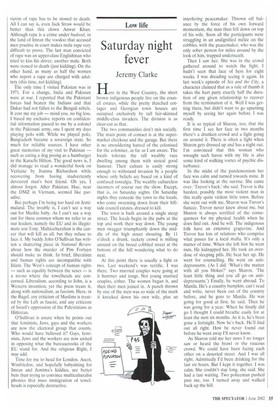Low life
Saturday night fever
Jeremy Clarke
Here in the West Country, the short brown indigenous people live on the council estates, while the pretty thatched cottages and Georgian town houses are occupied exclusively by tall fair-skinned middle-class invaders. The division is as clear-cut as that.
The two communities don't mix socially. The main point of contact is at the supermarket checkout and the garage. But there is no smouldering hatred of the colonised for the coloniser, as far as I am aware. The locals tolerate the tall wealthy race dwelling among them with stoical good humour. Their culture is easily strong enough to withstand invasion by a people whose only beliefs are based on a kind of confused nostalgia. The wealthy cultureless incomers of course run the show. Except, that is, on Saturday nights. On Saturday nights they concede the town to the locals, who come swarming down from their hillside council estates, dressed to kill.
The town is built around a single steep street. The locals begin in the pubs at the top and work their way down. The young men swagger triumphantly down the middle of the high street shouting. By 11 o'clock a drunk, rackety crowd is milling around on the broad cobbled street at the bottom of the hill wondering what to do next.
At this point there is usually a fight or two. Last weekend's was terrific. I was there. Two married couples were going at it hammer and tongs. Not young married couples, either. The women began it, and then their men joined in. A punch thrown by one of the men was so wide of the mark it knocked down his own wife, plus an interfering peacemaker. Thrown off balance by the force of his own forward momentum, the man then fell down on top of his wife. Soon all the participants were struggling in an undignified melee on the cobbles, with the peacemaker, who was the only sober person for miles around by the look of him, trapped underneath.
Then I saw her. She was in the crowd gathered around to watch the fight. I hadn't seen that face of hers for eight weeks. I was dreading seeing it again. In last week's episode of Sex and the City, a character claimed that as a rule of thumb it takes the hurt party exactly half the duration of any given relationship to recover from the termination of it. Well I was getting there, but didn't want to go upsetting myself by seeing her again before I was ready.
It is so typical of Sharon, too, that the first time I see her face in two months there's a drunken crowd and a fight going On around it. There is often a fight when Sharon gets dressed up and has a night out. I'm convinced that this woman who wrought such havoc with my life is also some kind of walking vortex of psychic disturbance.
In the midst of the pandemonium her face was calm and turned towards mine. It was like looking at the sunrise. She came over. 'Trevor's back,' she said. Trevor is the hardest, possibly the most violent man in this really quite violent little town. Before she went out with me, Sharon was Trevor's fiancée, Trevor never knew about me, but Sharon is always terrified of the consequences for my physical health when he does find out. And he will. The indigenous folk have an extensive grapevine. And Trevor has lots of relations who comprise what passes for a local mafia. It's only a matter of time. When she left him he went nuts. He kidnapped her. He took an overdose of sleeping pills. He beat her up. He went for counselling. He went on antidepressants. (As I did. 'What's the matter with all you blokes?' says Sharon. 'The least little thing and you all go on antidepressants.') Finally, he went abroad. To Manila. He's a country bumpkin, can't read and write, never been out of the country before, and he goes to Manila. He was going for good at first, he said. Then he was going for a year. When he finally did go I thought I could breathe easily for at least the next six months. As it is, he's been gone a fortnight. Now he's back. He'll find out all right. How he never found out before he went away I'll never know.
As Sharon told me her news I no longer saw or heard the brawl or the raucous crowd. We could have been facing each other on a deserted street. And I was all right. Admittedly I'd been drinking for the last six hours. But I kept it together. I was calm. She couldn't stay long, she said. She had a taxi waiting. Two policeman pushed past me, too. I turned away and walked back up the hill.






































































 Previous page
Previous page